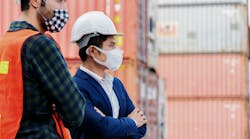The state of Virginia is the first state to adopt a temporary emergency standard to protect workers from exposure to COVID-19. The measure went into effect on July 15.
As the threat of the novel coronavirus continues to permeate media outlets and American households, organizations continue to call on OSHA to enact a federal standard to hold employers accountable.
American Federation of Labor and Congress of Industrial Organizations (AFL-CIO) President Richard Trumka has been outspoken about the Trump administration's efforts to contain the outbreak. He wrote in a statement on July 15:
We commend Virginia for being the first state in the nation to issue a comprehensive standard to protect all workers from COVID-19. The virus continues to pose a grave danger to working people and this strong, enforceable standard requires state employers to improve working conditions through clear, science-based measures, preventing further outbreaks in our communities. Virginia had to step in where the Trump administration has failed woefully to protect workers who are risking our lives and our livelihoods during this pandemic. Workers and our unions will continue to advocate for a federal standard that protects all working people, private and public, no matter where we live.
Trumka previously wrote a letter to U.S. Secretary of Labor Eugene Scalia, stating the agency has been "missing in action" during the global health crisis.
Scalia defended the OSHA's actions and those of U.S. employers, writing, "employers are implementing measures to protect workers, in workplaces across the country. (And employers who fail to take steps are likely violating existing OSHA violations.) Moreover, the steps employers are making include the very measures your letters say should be in a new rule," including risk assessment, sanitation, PPE and training and education.
The National Safety Council (NSC) also has called for the agency to take steps toward a temporary emergency standard. To date, OSHA has been using its authority under the general duty clause of the OSH Act but has failed to issue any citations.
“Employers must know the specific measures they are required to take to protect their workers and the public,” said Lorraine M. Martin, NSC president and CEO, in a statement. “NSC has been an ardent, strong supporter of OSHA since the agency’s founding, and we have watched it take life-saving actions in the midst of other crisis situations. We expect it will do so again, especially knowing that safety is vital to not only workers’ health, but also to our economic recovery as a nation.”
The NSC suggested the following prevention measures that should be included in the federal standard:
1. Accessibility to hand-washing in accordance with the Centers for Disease Control and Prevention (CDC) recommendations
2. Physical distancing requirements following CDC guidelines
3. Facial coverings that may include personal protective equipment (PPE) or cloth facial coverings based on the work environment and risk assessment
4. Utilization of the hierarchy of controls to include engineering and administrative controls and PPE use
5. Workplace COVID-19 symptom screening protocols
6. Workplace response plan development

